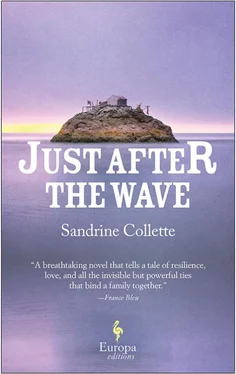And yet there is this strange lack of awareness that makes them chatter as they stride across the island, arguing this way and that, they will die, or they won’t, six days or five or seven, where will it flood last, where should they build a hut or put up a tent to keep going until the last moment. It feels unreal, as if death had no consistency—and yet again, their knowledge of that thing was too fleeting for them to be truly afraid of it, they cannot imagine what it means to drown. Right away the idea of a hut distracts them, amuses them; not one of the three tells the others to be quiet because there is danger, because there is urgency. They think. Where can they find wooden poles for the structure of a tent or a roof, what can they use for tarps, which sheets if they have to, how big. What will resist the sun and wind, how much food and water should they take; and the hens, and a mattress for the three of them.
So of course while they are dawdling from place to place on the tiny island, of course when the boat appears on the horizon, a little dark spot melting into the sunlight, they don’t even notice it.
Yet it is there, that boat, for the time being it is in the distance, uncertain, but there can be no doubt that it has set its course for their hill—the only land within sight when you are coming the way it is from the northwest, the other islands are on the other side, invisible. On the boat a figure is moving about. It’s because of a brusqueness in its movements, an impatience, that an hour later, when Louie springs up all of a sudden with a shout, they will all swear it is Pata on his way back.
The fact that it is far too soon: they don’t think of that.
That the high ground is to the east and not the northwest, they’ve forgotten that.
* * *
Damn water, everywhere, he hasn’t seen a patch of land anywhere for days. And for days he’s been looking at the sky, after he weathered the storm, well, it passed him by, some ways away, but those huge waves nearly capsized the tub and left it half full of water, damn rotten boat, no wonder he was able to steal it, nobody wanted it anymore. So here he is now, on the sea, he hates the sea—he doesn’t even know how to swim—rowing this way and that without a map or a compass, he didn’t have time, he knows he’s doomed. But as long as there’s life, and a rage—so he clenches his fists as he scoops into the water with his oars, he ought to know, it does no good to moan, there’s no one there to hear him, no one to help him, Row, asshole , that’s how he speaks to himself.
He used up his meager supplies two days ago. Just some lukewarm water left at the bottom of a bottle rolling on the floorboards. He left in a hurry maybe a week ago—they were bound to figure out he was the one who’d tortured the old man to make him say where he’d hidden his money; he should’ve killed that old man, anyway, rather than leave him half dead on the floor of his shack, and now the old man has Ades’s face printed on his retina, all he has to do is give his name to the people who came to rescue him and the hunt will be on.
So he left just before.
Didn’t think it through.
Where?
Fucking shit. What the fuck does he know, from where he’s headed.
It’s just that Ades doesn’t want to get caught. These days, people make their own justice, and that’s bad for him, with all those honest folk who’ve decided that the earth is too small now to put up with scum like him. They will throw him in the water, not a moment’s hesitation, with two fine stones on his feet to make sure he goes down good; he’d been there when Jean and Atta, his old partners in crime, got themselves lynched, and he knows that he isn’t any better than them. Only a matter of time: his turn will come.
But he got the hell out of there too fast, that was for sure, and he didn’t prepare anything. When he heard the door open downstairs, in the house where a dozen of them were squatting without permission, he got up with a start, grabbed his bag and his jacket, jumped out the window and started running: he knew the way by heart. Escape is burned inside him, viscerally, a spark that can galvanize his entire body in a few fractions of a second, an animal instinct, ageless.
And that was it.
After that, came the old boat—out of gas two days ago, heavy as a tank—and the infinite sea, and the near-certainty that it will all end here.
Unless.
He actually begins to dance, Ades, when he sees the smudge on the horizon. He even barks an oath, narrowing his eyes to be sure he’s not dreaming, and hell’s bells, no, he’s not dreaming, it doesn’t move, it doesn’t disappear. An hour later he knows it’s an island and that he’ll reach it before the afternoon is out. He has to get a lot closer before he can make out the outline of the house and nod his head, until it becomes obvious: the island is inhabited. In a way, that reassures him. He’ll find something to eat and drink, a roof for his head. But it’s bad news, too, because he doesn’t know what he’ll find on that land, peaceful families or nervous little warriors, and as he runs his tongue over his teeth the way he always does when he’s annoyed, he wonders what to expect, and how to present himself. The long knife in his pocket is a comfort. If he looks despondent, he can pass himself off as a man who lost his family in the storm and is trying to find his way back to high ground. They’ll put him up for a night or two; then he’ll see. It depends on so many things. How many of them there are. What they’re like. What they have, and what they tell him. His fierceness is written on his low brow, in the gleam of his yellowish eyes. Some families, when they saw him coming, would offer him what they had in exchange for the promise that he’d be on his way. He loves that mute power, the dull fear his presence inspires. But he hasn’t forgotten that people would rather see him dead, that all it takes is one man a smidgen meaner than he is and he’ll end up on the ground, felled by the bullet of a rifle or his throat slit by a knife.
But not everyone knows him, of course.
So now he’s getting closer to the island, and he’s thought through all the possibilities, and decided to show up nice and smiley, and then he’ll see. First he’ll eat, and sleep. With one eye open, as always. Find out which way to go, hope they have a map. Keep his voice down—unless someone comes looking to start a fight, because he’s hot-blooded, is Ades, it doesn’t take much to get him worked up. Damnation, he thinks, there was me thinking I’d die on this boat.
He laughs. He can see the island is small, that he shouldn’t expect much.
He doesn’t care, he’s not expecting anything, just some food and a bed. For the rest, he has faith. He is capable of taking everything, stealing everything, killing everything, silently and without remorse. That’s his strength, this absence of scruples. His conscience died years ago, in the fire that killed his parents and his sister, an accident the police called it back then, an accident that had tied his father and mother to a chair while someone held burning brands to the curtains. The baby girl was in her cradle next to the fireplace.
No, he didn’t do it, it wasn’t Ades who set the fire. In those days he was a normal kid. But the father did a fair amount of trafficking; there were threats, his old man was sick of it all, had never believed those threats: proof he should have. He was sure he was untouchable. What Ades learned in that moment was that you were the strongest and the craziest until the day you met someone stronger and crazier than you were—and there was always someone. He owed the fact that he’d lived nearly to the age of forty now to his unrelenting vigilance; mistrust was his bible, and besides, may as well say it, he didn’t know what it meant to hesitate, to pity, or to feel.
Читать дальше












